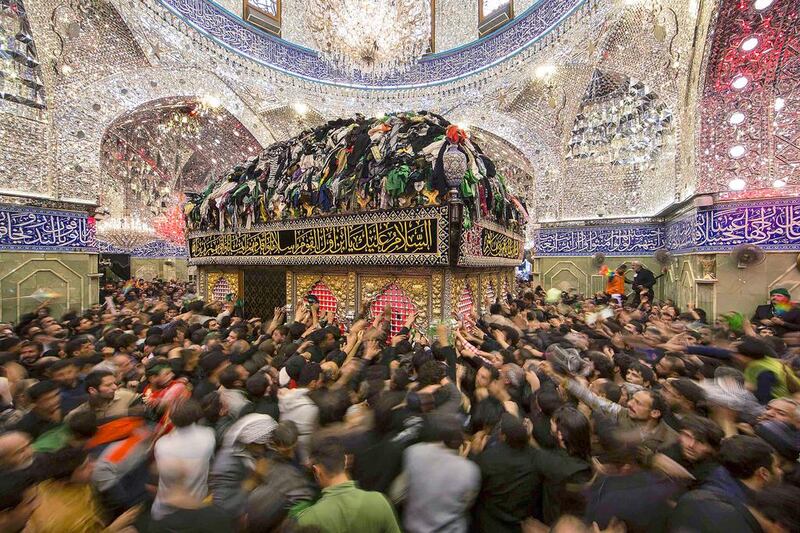KARBALA // Millions of Shiite pilgrims defied the threat of ISIL attacks and thronged the Iraqi shrine city of Karbala on Saturday for the climax of annual Arbaeen mourning rituals.
Some had walked for more than 12 days, from Iraq’s far south or across the border from Iran, while others were bused in or crammed into lorries for the journey.
Defence minister Khaled Al Obeidi said a total of 17 million will have gone through Karbala for Arbaeen this year, including more than four million foreigners from 60 countries.
A sea of devotees descended on the city’s shrine of Imam Hussein, beating their heads and chests to show remorse for not saving him from the armies of the caliph Yazid that beheaded him in 680AD.
While many chanted in unison, rapt in a collective religious trance, others were keenly aware of the symbolic power Arbaeen could have in the war against ISIL.
A mortar attack that killed one person on Friday highlighted the security concerns surrounding what is believed to be one of the largest religious gatherings in the world.
But the pilgrims were undeterred.
“Forget mortars, even if it rains jihadists on Karbala, we will not be prevented from visiting the Imam Hussein shrine,” said Kadhem Hussein, a 25-year-old who had walked from Nasiriyah, some 300 kilometres away.
ISIL considers Shiites to be heretics and has made targeting the community one of its main objectives.
Meanwhile, ISIL fighters stormed a town in Iraq’s western Anbar province on Saturday, killing at least 19 policemen and trapping others inside their headquarters, in the latest attack in the desert region where it controls large amounts of territory, officials said.
ISIL seized the town of AlWafa, 45 kilometres west of Anbar’s capital Ramadi on Saturday after starting its assault early on Friday.
With the capture of Al Wafa, ISIL now controls three major towns to the west of Ramadi, including Hit and Kubaisa. ISIL and government forces have been bogged down in a months-long battle for Ramadi.
Al Wafa fell in a surprise attack that drew fresh attention to the Iraqi government’s struggle to arm Sunni tribes in western Iraq who are fighting ISIL.
“Police forces have been fighting Islamic State fighters since Friday, but lack of ammunition forced it to retreat and losing the town. I’m frustrated because we were left alone without support,” said Hussain Kassar, the town’s mayor.
Police forces backed by few members of government-paid Sunni tribal fighters tried to prevent the militants from crossing the sand barrier surrounding the town, but were overwhelmed when sleeper cells from inside open fired on them, the mayor and a police officer said.
Police forces and the pro-government Sunni fighters were forced to retreat to a nearby police-brigade headquarters bordering their town.
“We are trapped inside the police 18th brigade. Islamic State managed to surround us today. If no government forces were sent to help us then we will be exterminated,” the mayor, who was with the police forces that withdrew from Al Wafa, said by telephone.
Elsewhere in western Anbar, ISIL militants executed at least 21 Sunni tribal fighters on Friday after capturing them near Al Baghdadi town on Wednesday, local officials and tribesmen said on Saturday. ISIL has besieged Al Baghdadi, also to the west of Ramadi, since October.
All the bodies had bullet wounds to the head and chest and were dumped inside an orchard near the ISIL controlled town of Kubaisa.
The militants have captured swathes of western and northern Iraq, including the north’s biggest city, Mosul, in June. They now hold large territory from western Anbar and Nineveh provinces that extends across the border into Syria.
A senior UN official arrived in Damascus Saturday for talks on a plan to suspend fighting between government and rebel forces in the country’s second city Aleppo.
Ramzi Ezzedine Ramzi, deputy to the UN envoy to Syria, Staffan de Mistura, is to hold a series of meetings in Damascus, their spokeswoman Juliette Touma said.
At the start of the week, Mr De Mistura held what Ms Touma termed “constructive” talks on Aleppo with rebel groups in Gaziantep, Turkey.
In late October, he had announced a plan for a “freeze” in fighting, following a series of failed international efforts to negotiate an end to the Syrian conflict, which erupted in March 2011.
He has since said the northern city of Aleppo is a “good candidate” for the bid.
The city has been divided between regime control in the west and rebels in the east since mid-2012.
Syrian foreign minister Walid Muallem has called for rebels to hand over their heavy weapons and allow the return of local administration officials to Aleppo under any deal.
For their part, the rebels want guarantees of an effective freeze on the ground and that government forces are not redeployed from Aleppo to the flashpoint Eastern Ghouta region near Damascus.
* Agence France-Presse, Reuters





